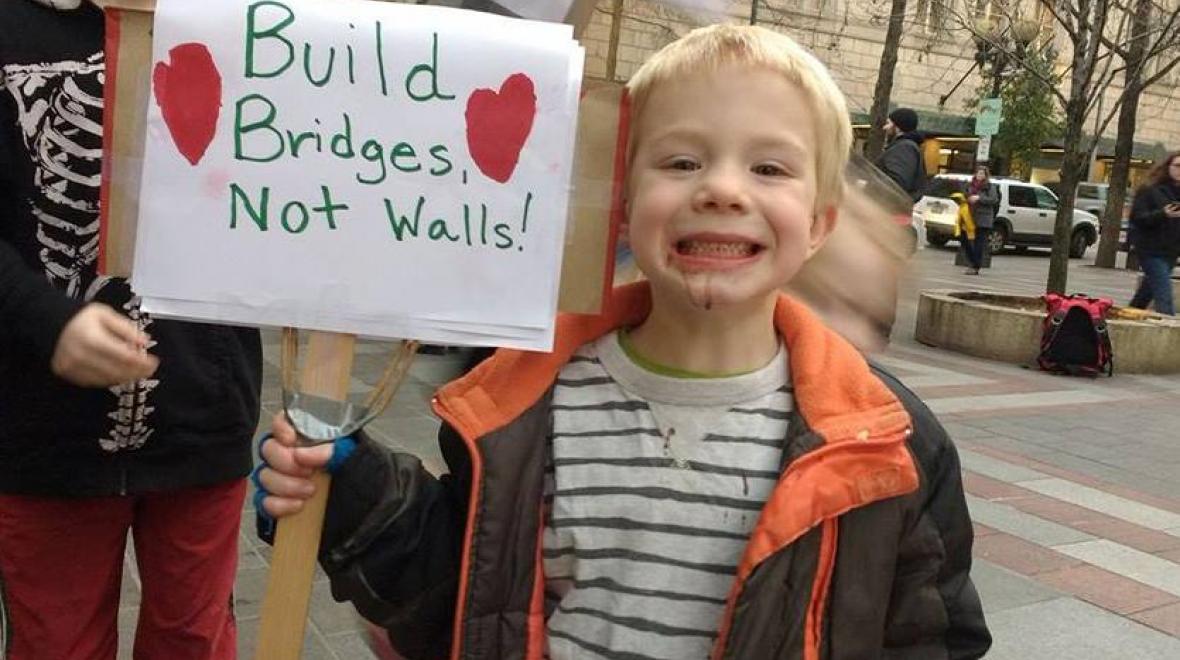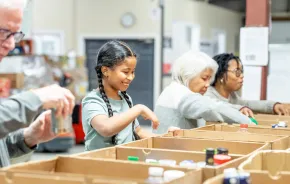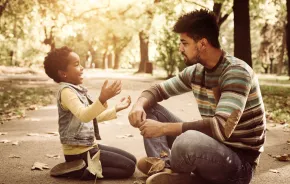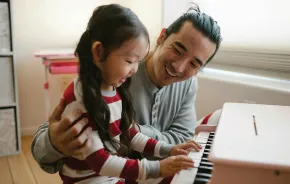
Protesting comes naturally to kids. If you serve my three children ice cream, you’ll witness their diehard commitment to protesting if one of them doesn’t receive an equally portioned scoop.
“He got more than me — it’s not fair!“
Just eat the damn ice cream and be grateful! I’m tempted to yell.
Instead of giving into annoyance, I try to remind myself that the drive to speak up against a perceived injustice is a quality I want to nurture in my kids. We don’t always live in an equal-scoop world. I want my children to value fairness and to feel empowered to question authority when something seems wrong — especially since they have so much privilege compared to many.
It might be ice cream today, but tomorrow, perhaps they will stand up for a bullied classmate or tell a trusted adult a painful secret that they’ve been threatened to hide.
Here are a few concepts we’re working on in our family related to injustice and standing up for what is right.
Listen to your conscience
First, my husband and I want my children to learn to listen to their gut, to trust that voice inside that tells them when something is wrong.
As one of their favorite poets, Shel Silverstein, writes:
There is a voice inside of you
that whispers all day long.
‘I feel that this is right for me,
I know that this is wrong.’
No teacher, preacher, parent, friend
or wise man can decide
what's right for you — just listen to
the voice that speaks inside.
This isn’t a concept too nuanced for kids to grasp; A recent study in the Nature Human Behaviour journal suggests that even babies have an innate sense of justice; children as young as 6 months old are able to understand interactions between a bully and their victim.
When one of my kids is vocal about a perceived injustice — no matter how ridiculous it might seem — I remind myself to listen. The right to petition the government for a redress of grievances without fear of punishment is central to democracy. I try to let my kids ask questions without fear of punishment, too.
Sample conversation:
Child: “It’s not fair that I have to clean my bedroom.”
Parent: “Why is it unfair? Who should be responsible for cleaning your room? What do you think a fair solution would look like?”
When my kids feel heard they are more likely to comply with established rules. That initial investment of patience pays off over time.
Act, even if it is uncomfortable
Second, I want my kids to feel empowered to act when they identify an opportunity to help or when they witness an injustice, even if it means acting against societal (or schoolyard) expectations.
When my oldest began attending elementary school, he would often come home and complain that he didn’t have a friend to play with at recess — a common schoolyard conundrum, but one that I felt helpless to fix.
Then I read about first-grader Christian Bucks, who brought the idea of a “Buddy Bench” — a bench where a child in need of a playmate can sit to signal they’d like to play — to his principal. Last year, the PTA at my son’s school raised funds to install a Buddy Bench — all thanks to a first-grader thousands of miles away who decided to act.
But while acts of kindness are almost always embraced with acceptance, standing up to authority is a more difficult concept for children — and adults — to grasp. One of the most prominent studies of obedience in psychology was the famous 1963 Milgram Experiment, which explored the conflict between obedience to authority and personal conscience.
"Freedom's progress depends on disobedient children."
The chilling conclusion of the study? “Ordinary people are likely to follow orders given by an authority figure, even to the extent of killing an innocent human being.”
Growing up Mormon, a culture where obedience and politeness are touted as important virtues, I witnessed the damage that an obedience-at-all-costs mindset can do in the wrong hands. Elizabeth Smart, a Mormon-raised survivor of a childhood abduction, has become an outspoken advocate for empowering kids to be more assertive in the face of danger and abuse with the personal empowerment safety organization radKIDS.
“radKIDS doesn’t tell kids what not to do, it helps them come up with a plan for themselves of what they can do,” she said in an interview.

Advocate alongside those with less privilege
We are also trying to teach our children that democracy isn't just a privilege but a responsibility, and that protesting is an important part of ensuring our freedoms are protected.
In January, we took our kids to Seattle’s Westlake Center to protest the executive order banning travel from seven majority-Muslim countries at a rally.
We had all just recovered from a bout with the flu. We were exhausted and cranky and my doubts about how it would pan out nearly kept us comfortably at home. (Don’t miss this fabulous piece full of tips on protesting with kids that I wish I’d read before we went).
As my kids decorated signs to bring, we discussed the experiences of many refugees — what it might be like to live in a country where bombs fell from the sky on houses, where people were so desperate to leave that they left their homes and possessions, traveling in unsafe rafts across the sea or walking many hard miles to try to find safety.
“We should help them. If there is a little girl who needs a home, I can get a bunk bed and share my clothes and toys,” my daughter said.
As a mom who is painfully aware of all the ways I could do better — these are the moments I live for.
Protesting with kids isn’t all aha moments. I summed up how that day went on a Facebook post:
“Protesting with kids = 80% finding a bathroom, 10% trying to see while the kid on your shoulders covers your eyes, 5% whining and 5% actual protesting. But hey, at least we tried.”
Protesting with kids = 80% finding a bathroom, 10% trying to see while the kid on your shoulders covers your eyes, 5% whining and 5% actual protesting. But hey, at least we tried.”
While our time at the protest was short and consisted mostly of looking for an available restroom, I hope my children learned that when something is wrong, we don’t wait around for someone else to be the impetus for change.
In the following weeks, I’ve been surprised by what my children took from the experience. They haven’t stopped asking about refugees and immigrants trying to come to our country. They’ve included them in their bedtime prayers and asked if we will go to any other rallies. As they grow and further develop their own opinions and passions, I hope they will continue to feel empowered to champion causes they deem important.
And as we continue to navigate the power struggles that are a daily part of parenting, I’ve made the words of pioneering gay activist, author and journalist Marty Rubin, my mantra: “Freedom's progress depends on disobedient children.”
Resources on activism with kidsRead ParentMap's article on tips for protesting with kids. Find a scheduled Lobby Day for an organization or issue that you support and schedule a visit to Olympia to speak with legislators. What can be more inspiring for kids than seeing government in action and speaking directly with legislators? PBS Kids has an excellent resource for talking to kids about the issue of immigration in terms that they can understand. Don’t miss its resource page for finding and giving help. PBS Education offers tools, resources, and creative solutions for learning and teaching about the U.S. presidential election process, fostering democratic values, and encouraging civic engagement. radKIDS is a personal empowerment safety organization started by Elizabeth Smart. Contact your elected officials or host a postcard party with like-minded friends. Kids can help decorate postcards to send to elected officials on issues they are passionate about. Volunteer for organizations and causes you are passionate about and find local volunteer opportunities on VolunteerMatch and Idealist. When contemplating charitable donations, check out Charity Navigator to see how they measure up in areas such as financial performance and transparency. |











